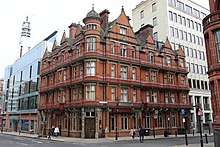Frank Barlow Osborn
Frank Barlow Osborn FRIBA (June 1840 - 6 April 1907) was an English architect based in Birmingham.[1]

106-110 Edmund Street, Birmingham of 1895 for W.M. Smythe Solicitors' offices
Life
He was articled to Charles Edge and then transferred to Samuel Sanders Teulon. He started his own practice in 1864 and was in partnership with Alfred Reading from 1876. This partnership was dissolved in 1891.[2] At this date, he was based at 13 Bennett’s Hill, Birmingham.
One of his pupils was Thomas Walter Francis Newton who went into practice with Alfred Edward Cheatle and built many arts and crafts style buildings in Birmingham.
He was appointed Fellow of the Royal British Institute of Architects in 1872, and was President of the Birmingham Institute of Architects.
Works
- Palm House, Birmingham Botanical Gardens 1871
- Bandstand, Birmingham Botanical Gardens 1873
- St Margaret’s Church, Ladywood 1875
- St Cyprian's Church, Hay Mills 1878
- St Catherine's Church, Nechells 1878
- 8-10 Tenby Street, Birmingham 1879
- Black Lion Pub, Essex Street, Birmingham 1879 - 1880
- Thorp Street drill hall, Birmingham 1881
- Methodist Central Hall, Corporation Street, Birmingham 1887 (replaced in 1900)
- Office building, Sheepcote Street, Birmingham 1890
- Christ Church, Quinton, Birmingham 1890 restoration
- St Thomas Mission Hall, Ellis Street 1891
- St. Thomas' Church, Birmingham 1893 restoration
- London and Midland Bank, High Street/Little Park Street, Coventry 1894[3]
- W.M. Smythe Solicitors' offices, 29 Newhall Street/106-110 Edmund Street, Birmingham 1895
- Extension to the Royal Institution for Deaf and Dumb Children, Church Road, Edgbaston 1899
- Extension to the Birmingham Smithfield Vegetable Market 1903[4]
- St Peter's Church, Spring Hill 1902
References
- Directory of British Architects 1834-1914. RIBA. 2001.
- "Notice is Hereby Given". Birmingham Daily Post. Birmingham. 5 February 1891. Retrieved 7 March 2015.
- "Coventry". Coventry Herald. Coventry. 12 October 1894. Retrieved 7 March 2015.
- "Extension of the Vegetable Market". Birmingham Daily Post. Birmingham. 27 July 1900. Retrieved 7 March 2015.
This article is issued from Wikipedia. The text is licensed under Creative Commons - Attribution - Sharealike. Additional terms may apply for the media files.